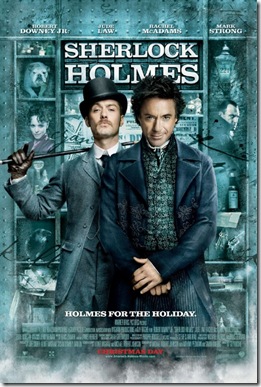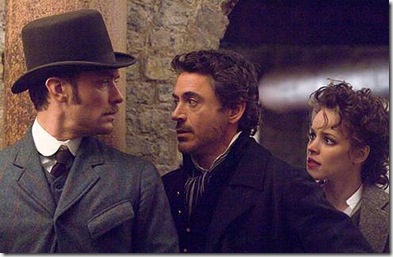Let me be perfectly clear – although I’ve read the Holmes canon several time, and fifty or sixty [or so] of the multitudes of Holmes pastiches, I am not a Baker Street Irregular. Still, I would imagine that most Irregulars would find much to enjoy about Guy Ritchie’s take on Sir Arthur Conan Doyle’s immortal creation – but they would likely also [like me] find some jarring errors that do, indeed, detract from what is, essentially, a fun diversion.
One of the more egregious goofs concerns Dr. John H. Watson’s [Jude Law] first wife, Mary Morstan [Kelly Reilly], whom Holmes meets – in the canon, at least – while in the company of the good doctor. Not so here – though, as if to make up for that blunder, Ritchie’s Morstan has the kind of steel to her that attracted Watson in the canon.
Ritchie – and screenwriters Michael Robert Johnson, Anthony Peckham and Simon Kinberg – fare a good deal better with the Great Detective and his chronicler, Watson. Once you get past the action sequences – most of which are borne of canonical allusions – Robert Downey Jr.’s Holmes is the master of obscure knowledge and observation found in the Conan Doyle adventures. Watson is the tough, smart, resourceful former military doctor that Holmes fans found in canon as well.
The story would not be out of place in the canon, as well. The plot by Lord Blackwood [Mark Strong] to take over the British Empire [including former colony the United States] seems grounded in the supernatural and, therefore, theoretically beyond the powers of even as excellent a set of mortals as Holmes and Watson – and American adventuress Irene Adler [Rachel McAdams] [of whom Watson noted, “for Holmes she would always be ‘the woman’”].
We are introduced to Holmes as he, Watson and Inspector Lestrade [Eddie Marsan] put paid to an attempted ritual murder by the aforementioned Lord Blackwood. When it appears he has come back from the grave following being hung for his crimes [the hanging witnessed by Watson, who also pronounces him dead], Holmes and Watson are drawn into one of their strangest cases. Even stranger, for most viewers, is the manner in which we Holmes plot his attack on Lord Blackwood and his henchmen – seeing each step in his mind in slow motion before we see him enact those plans in real time seconds later. [We also see this kind of planning when a bored Holmes engages in a boxing match before being distracted by Adler.]
Lurking in the background is a shadowy figure who has employed Adler to distract Holmes at a key moment. It requires little imagination for anyone even moderately knowledgeable about the Holmes stories to deduce who that would be, but I’ll leave that revelation – along with the film’s denouement – for you to discover.
From the kinetic style Ritchie brings to Holmes’ London, it would seem that he was attempting to make the detective a rock & roller. There are several action set pieces that are well beyond anything in Conan Doyle’s tales – though, as I mentioned before, they utilize skills which are alluded to in those stories. The result is considerably more fun, though no less intelligent, than previous big screen incarnations of Holmes.
In the same vein, if less explosive, Ritchie’s Watson has begun to gain a bit on Holmes in the deduction department. Some of his deductions prove helpful, which is new, but not totally unexpected. And just as Downey Jr. gives Holmes the characteristics he needs to be the Great Detective and then expands upon them, Law follows suit with Watson whom he gives a more swashbuckling edge than we’ve seen before. And the banter between the two would not be out of place in the canon – Holmes being a rotten roommate [a certain burst of gunfire will delight the Irregulars no end] and Watson being not at all happy about it.
Ritchie’s less than flattering palette – blues, greys and browns – builds the mood and sets a counterpoint to the action-hero Holmes, giving us a London that makes the film’s slight steampunk leanings more effective.
In the end, Sherlock Holmes is fun; an engaging trifle. It may not stay with you much past the theater parking lot, but while you’re in the theater, you will be entertained.
Final Grade: B+

